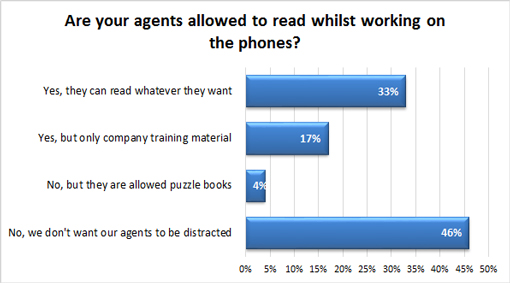2nd April 2014

We took a closer look at why some managers allow their agents to read between calls, while others forbid it.
![]()
If there is no customer service to be done, and no productive use of an agent’s time possible, there is only so much that can be expected of any employee. I think it’s pretty tough to expect agents to always get stuck into company literature and/or the knowledge base if they have a spare 3 minutes!
It can be easy to act as if agents are responsible for there being no productive work for them to do; they aren’t, and periods of low occupancy occur in even the best-run operations because the vast majority of contact centres don’t have more than 500 positions occupied at all times.
There are always going to be call centre situations where occupancy is low, so my question is “What’s the risk of letting people read during quiet periods?”
With thanks to Paddy
![]()
Our standard approach is not to allow this activity, even though there are occasions when agents can be waiting a couple of minutes for a call.
In our low season we use a lot of the time for training, development and refreshers.
With thanks to Linda
![]()
I disagree with reading anything non-industry/job/improvement related.
If there is time in between calls, set up regular knowledge reviews online. These should be set up to be completed at the individual’s leisure within a given month/quarter. It is also helpful if these reviews can be saved so the agent can access them as and when they have the chance.
With thanks to Jacqui

Results based on November/December 2013 poll of 606 individuals.
![]()
A book is going too far, because if you have this much time the manager is not leading.
Relevant literature to the industry type or contract that the calls are related to would be useful to promote lively rapport building and enhance customer service.
With thanks to David
![]()
I have to say that in the contact centre where I work I don’t have time to read.
If I am not on a call I am busy with emails or assisting colleagues with enquiries or a challenge they may have.
With thanks to David
![]()
If there is enough time between calls to read a book or a magazine, then you are overstaffed!
There should be a reasonable time delay between transactions so that your agents don’t get burnt out, and there are always peaks and troughs too. But that’s where a decent WFM tool comes in to anticipate, forecast, plan and schedule.
With thanks to Richard
![]()
I think that work is for work and breaks are for personal reading, emails and texting.
The company is after all paying for people’s time whilst they are in work.
With thanks to Jacqui
![]()
I’ve previously managed a contact centre where we didn’t allow reading during core hours (7am-7pm) and instead focused agents on other ‘work’. However, after 7pm, when volumes were more sporadic, we did.
But if occupancy is so low that people have excessive reading time then you should review your staff numbers.
With thanks to David
![]()
In regard to reading itself, I’d first ask myself the question whether there is more value-adding work agents can do, such as product/procedural research (especially if they’re not 100% on target in all areas) or focus on their personal development planning.
With thanks to David
![]() I’ve got to admit I’m scratching my head a little about how agents can have so much free time between calls.
I’ve got to admit I’m scratching my head a little about how agents can have so much free time between calls.
With thanks to Robert
![]()
Maybe I’ve just been in very busy call centres, but the few times that the pace drops off there is always something to do.
Whether it’s personal maintenance like stretching or bathroom breaks, or organising some non-directly-related-to-a-call materials.
With thanks to Vytautas
![]()
If Agents or CSR have time to read they should read things relevant to their work such as campaign or knowledge-base materials.
If I am not on a call I would be busy with emails or assisting other members with enquiries or a challenge they may have.
With thanks to Rachel
![]()
As a general rule of thumb, I would lean towards not allowing agents to read at their desks.
If they have time to read between calls then they could be given something more productive to do, e.g. fulfilment, data cleansing, etc.
The same can be said for internet usage.
With thanks to Mathew
![]()
You are recruiting staff to do a job. Reading non-work-related material is not something that comes with the job, so it is a big risk to allow this – why should staff be sitting around?
If that happens, sometimes it is a good opportunity for managers/team leaders to spend time with staff and talk to them about individual performance.
With thanks to Baljinder